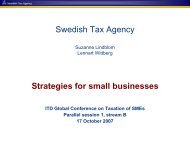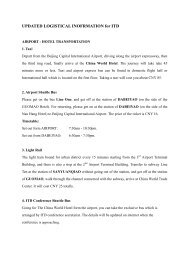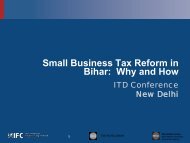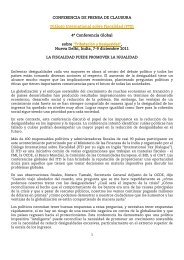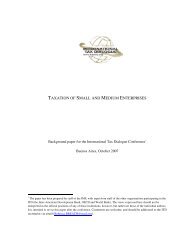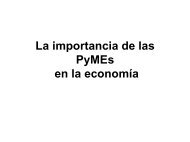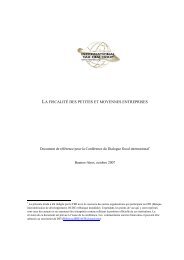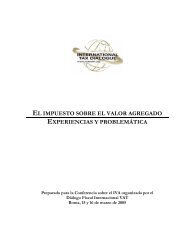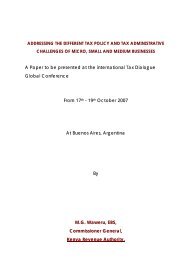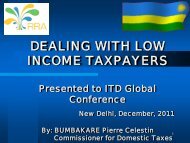Arcotia Hatsidimitris - International Tax Dialogue
Arcotia Hatsidimitris - International Tax Dialogue
Arcotia Hatsidimitris - International Tax Dialogue
Create successful ePaper yourself
Turn your PDF publications into a flip-book with our unique Google optimized e-Paper software.
68 – 8. TRANSFER PRICING AND DEVELOPING COUNTRIES<br />
Introduction<br />
Context<br />
There is a growing awareness on the part of developing countries of the risks posed by transfer<br />
pricing. Their goal in addressing these risks is identical to that of developed countries – to protect their tax<br />
bases while continuing to attract foreign direct investment and facilitate cross border trade. It is important<br />
to note that for some developing countries the tax base is still relatively small and for a subset it is still less<br />
than the aid they receive. Consequently it is not surprising that many developing countries are<br />
inexperienced in dealing with transfer pricing issues and their top priority is to assess the level of potential<br />
transfer pricing risk in their own country and grow capability and increase capacity in their tax<br />
administrations to effectively address that risk.<br />
A recent report to the G20 on "Supporting the Development of More Effective <strong>Tax</strong> Systems" 1<br />
considers some of the challenges developing countries face in the field of transfer pricing and some of the<br />
ways in which those challenges can be addressed. In their final declaration following the G20 Summit in<br />
Cannes the G20 leaders had this to say: "Consistent with the Multi-Year Action Plan agreed in Seoul, we<br />
strongly support developing countries mobilisation of domestic resources and their effective management<br />
as the main driver for development. This includes technical assistance and capacity building for designing<br />
and efficient managing of tax administrations and revenue systems and greater transparency, particularly in<br />
mineral and natural resource investment. We urge multinational enterprises to improve transparency and<br />
full compliance with applicable tax laws. We welcome initiatives to assist developing countries, on a<br />
demand led basis, in the drafting and implementation of their transfer pricing legislation. We encourage all<br />
countries to join the Global Forum on Transparency and Exchange of Information for <strong>Tax</strong> Purposes." This<br />
Chapter looks at the practical steps that can be taken to overcome the administrative challenges developing<br />
countries face in the field of transfer pricing and to improve financial transparency. It also considers the<br />
specific ways in which the FTA can provide the demand led assistance that the G20 declaration envisages.<br />
There is a limit to what any country, whether developed or developing, can achieve acting alone and<br />
so international co-operation has a crucial part to play. Developing countries have much to learn from one<br />
another about the practical solutions to the problems they face, both in terms of building capacity and in<br />
relation to specific cases, and regional organisations such as ATAF and CIAT provide a means of<br />
facilitating this dialogue and the pooling of knowledge and best practice. In addition, international bodies<br />
such as the OECD, <strong>International</strong> Monetary Fund and the World Bank have a part to play too as do<br />
countries that have tackled these types of challenges in the past and are able to share skills, knowledge and<br />
experience. Some developing countries may also buy in learning from major private sector tax firms but<br />
this can give rise to potential conflicts of interest where the firm is active in providing tax advice to private<br />
sector entities in the developing country and/or in its trading partners.<br />
When considering the scope of their transfer pricing programmes, developing countries may wish to<br />
focus initially on the business sectors in their economy and types of transactions where transfer pricing<br />
issues are most likely to be found – for example, the exploitation of mineral wealth and other types of<br />
natural resource, manufacturing, service industries and wholesale/retail supplies. This may be a more<br />
efficient use of resources than seeking to develop a transfer pricing regime focused, for instance, on an<br />
emerging financial services industry.<br />
Challenges<br />
For many developing countries the first challenge is to understand the number and type of MNEs<br />
operating in their jurisdiction and the types of transfer pricing risks that are likely to arise. This assessment<br />
DEALING EFFECTIVELY WITH THE CHALLENGES OF TRANSFER PRICING © OECD 2012



